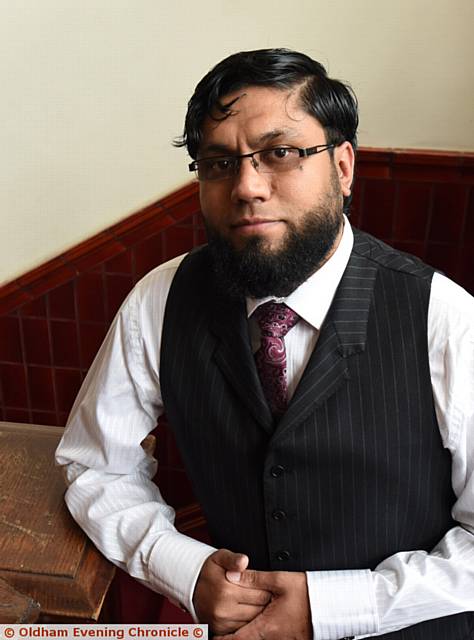We have seized chance to be different
Reporter: Karen Doherty
Date published: 09 June 2017

DEFENDING his school . . . Siddiq Munshi, head teacher at Blackstone Academy
THE Ofsted report doesn't do justice to what Blackstone Secondary is about, says headmaster Siddiq Munshi.
Instead, he explained that the school was re-thinking education from the roots: "The whole independent sector is about choosing to do education differently. Independent schools can choose to organise their education in a way that suits their needs, and we have seized that opportunity
"If I am doing education exactly the same way as a mainstream school, why should children come here and pay fees for what they would get for free down the road?"
Mr Munshi, who is a scholar and educationalist, said Blackstone is the first school to scrap GCSEs and discard the national curriculum to follow its own curriculum based on the liberal arts.
It is one of only a couple of mixed-sex Islamic schools, with male and female teachers.
But the former Manchester University student, who also graduated from an Islamic seminary in the UK, believes an education system based on exams and tests is not working for the large majority of young people: "The focus placed on teaching a GCSE specification narrows the scope of teaching and limits the range of content covered.
"The pressure to perform in league tables is considerable and can make a school into an exam factory with an overwhelmingly strong target-setting culture - one which we do not wish to adopt.
"GCSEs do not reflect the real ability, skills and knowledge of a student. I have come across many students who have As and A*s in so many subjects but when you speak to them, their language skills are poor."
But will a lack of formal qualifications prevent students from going to college or university?
No, said Mr Munshi: "There are many examples, past and present, of people getting into university through the unconventional route - on the merit of what they knew and could do."
Blackstone's curriculum is based on the liberal arts, which Mr Munshi said would equip students with the tools of learning and teach them how to think rather than what to think. It integrates secular and religious learning and focusses on grammar, logic and rhetoric, and ensures students understand the context of what they are learning.
Giving the example of maths, Mr Munshi said: "It is looking at the real significance of numbers, their history; for example, helping students to envisage a world before numbers came about. Knowledge has to be grounded in our history."
He continued: "I am trying to get rid of the secular and religious divide in the curriculum. When you go into Islamic schools there's a divide.
"Our vision is to educate and prepare pupils to become independent thinkers, intellectual scholars, and spiritual leaders who are deeply rooted in tradition yet wholly conversant with the modern world.
"We are giving them a broad and balanced curriculum that makes them rounded individuals and not someone who has a narrow conception of the world. I want our students to be widely read; from the great classics like Homer to Tolstoy, and anything from religion to quantum physics."
Most Viewed News Stories
- 1Milan Bar in Lees and The Bank at Delph close doors with immediate effect
- 2Punch perfect Kyle is Oldham's latest national boxing champ
- 3Group wanted following attempted robbery incident on a tram in Shaw
- 4Five arrested after two young victims are robbed
- 5Shaw prospect Rafferty aims to shine at massive 'Ring Warriors Unleashed' show




